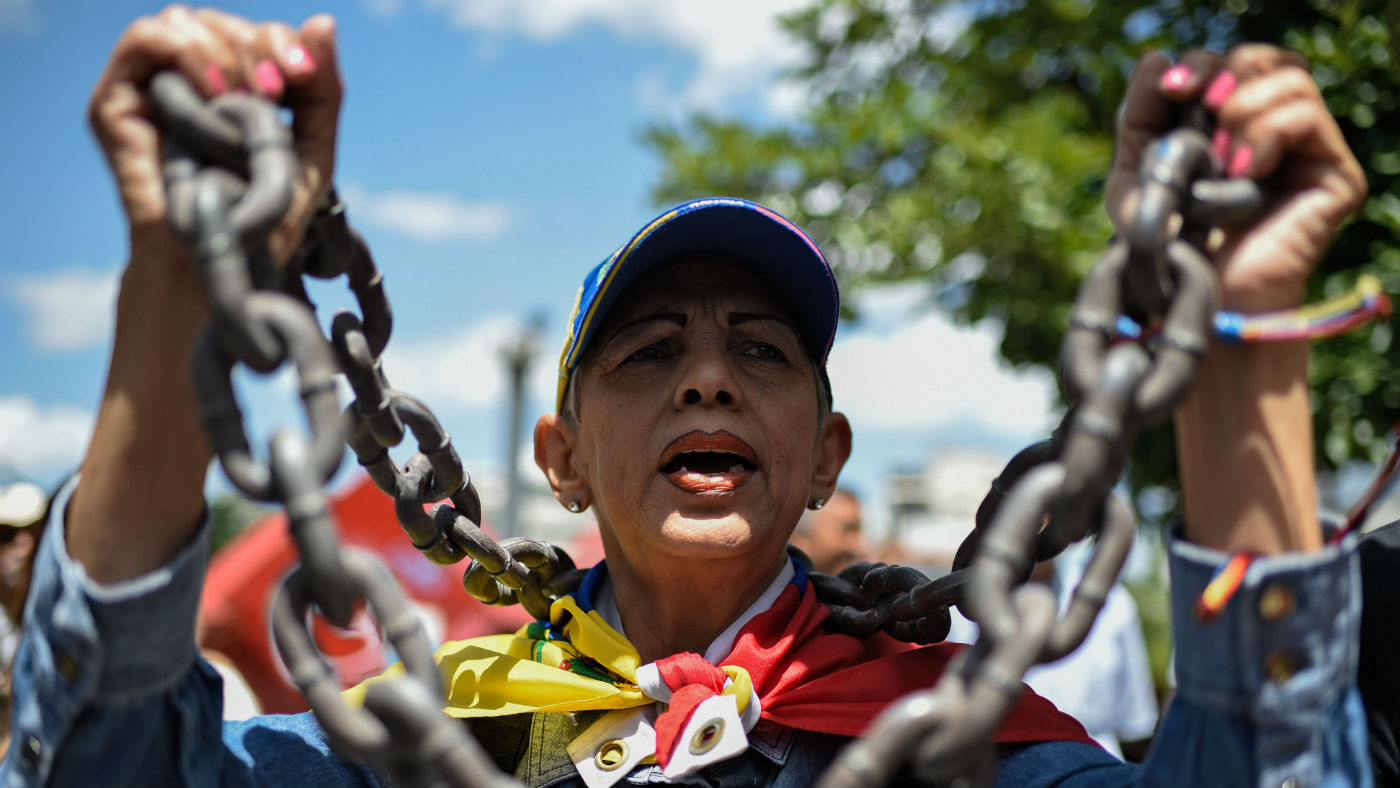What next for the Venezuela crisis?
US Vice-president Mike Pence to meet opposition leader Juan Guaido as prospect of military intervention mounts

A free daily email with the biggest news stories of the day – and the best features from TheWeek.com
You are now subscribed
Your newsletter sign-up was successful
US Vice-president Mike Pence is to announce “clear actions” to tackle the growing humanitarian crisis in Venezuela, where at least four people were killed and hundreds injured during clashes between government forces and opposition activists this weekend.
Pence is in neighbouring Colombia today for a meeting with Venezuelan opposition leader Juan Guaido, who has asked the US and “other countries to consider ‘all options’ to remove President Nicolas Maduro from power”, reports The Guardian.
More than 50 countries including the US have recognised Guaido as the legitimate leader of Venezuela, after he secured the backing of opposition parties in the country's National Assembly, which he leads, to proclaim himself interim president in January.
The Week
Escape your echo chamber. Get the facts behind the news, plus analysis from multiple perspectives.

Sign up for The Week's Free Newsletters
From our morning news briefing to a weekly Good News Newsletter, get the best of The Week delivered directly to your inbox.
From our morning news briefing to a weekly Good News Newsletter, get the best of The Week delivered directly to your inbox.
But Maduro has dismissed Guaido as a “puppet” of Donald Trump’s government, and has closed Venezuela’s border with Brazil and shut down several crossings with Colombia. In the process, Maduro has blocked supplies of food and medicine from entering his country.
What happened over the weekend?
Clashes between opposition protesters and forces loyal to Maduro that began on Friday are “threatening the image of Guaido’s non-violent movement”, says The New York Times.
The border town of Santa Elena de Uairen saw the worst of the violence, with pro-government armed gangs and Venezuela’s military taking to the streets in a bid to disperse opposition supporters. At least four people were killed and a further 18 injured by gunfire, according to campaign group Foro Penal.
A free daily email with the biggest news stories of the day – and the best features from TheWeek.com
Elsewhere along the border with Colombia, aid vehicles were set on fire and pro-Maduro militias fired tear gas at protesting crowds, injuring hundreds.
“It was one of the outcomes we had imagined, but it wasn’t the one we wanted,” Armando Armas, an opposition lawmaker, told the Times. “We can’t expose our people any more. The entry of humanitarian aid can’t be the trigger of a wider conflict.”
But a senior Trump administration official, who spoke to reporters on condition of anonymity, said: “What happened yesterday is not going to deter us from getting humanitarian aid into Venezuela.
“All [Maduro] demonstrated is he had enough henchmen to guard one end of three bridges in Colombia. That’s a tactical achievement for him. But it’s perishable.”
What might Pence and Guaido agree?
Pence will announce “concrete steps” and “clear actions” at a summit of the Lima Group - a bloc of 12 Latin American countries and Canada - in the Colombian capital Bogota on Monday, according to US officials. The vice-president will also have a one-on-one meeting with Guaido, although the US has not elaborated on exactly what kinds of measures might be declared.
In a clear hint that Guaido would support US military intervention in Venezuela, the opposition leader tweeted on Saturday: “The events of today oblige me to take a decision, to formally propose to the international community that we should keep all options open to achieve the liberation of our homeland.”
Trump did not immediately respond to Guaido, but the US leader said last month that “all options were on the table” and has “suggested invading Venezuela both in public and private”, notes The Guardian.
Asked whether the US would provide military assistance, if requested by Guaido, the anonymous US official said: “Ultimately, it would be a decision for the president to make.”
What happens next?
There have “always been strands of the Venezuelan opposition who have called for military intervention”, says The Guardian.
But exiled Venezuelan opposition leader David Smolansky, a close friend and ally of Guaido, told the newspaper that they were not asking for troops on the ground.
“It is still a peaceful movement,” he said. “Violence yesterday came from armed pro-government gangs and security forces.”
All the same, when pressed on whether he would support military intervention in the future, Smolansky declined to rule out the possibility, saying: “The only option we have is to restore democracy and freedom with internal and external pressure.”
According to US news site Axios, the driving force behind Trump’s hawkish Venezuela turn appears to be Pence, who isn’t the “impotent toady many assume him to be”.
Regardless of who is at the steering wheel, “the US rhetoric [has been] over the top”, said Charles S. Shapiro, a former ambassador to Venezuela. Shapiro claims the US response may have led some in the Venezuelan opposition to believe military assistance would be offered if Maduro continued to block aid deliveries.
US Secretary of State Mike Pompeo has been more circumspect than many of his colleagues, however. Pompeo told CNN that “further action will be contemplated” this week but that his government was focusing on sanctions, humanitarian aid and actions by Venezuelans themselves.
“The Venezuelan people will ultimately, I believe, hold accountable those who have done so much harm to the fundamental basic rights of the people of Venezuela,” he added.